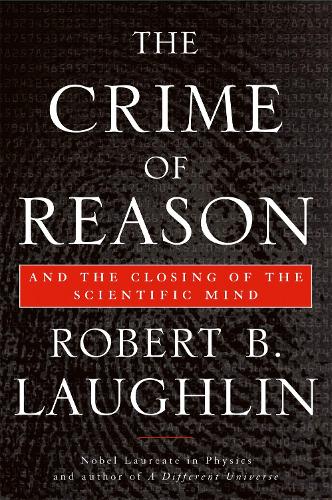
The Crime of Reason: And the Closing of the Scientific Mind
(Paperback)
Publishing Details
The Crime of Reason: And the Closing of the Scientific Mind
By (Author) Robert Laughlin
Basic Books
Basic Books
28th December 2010
United States
Classifications
Tertiary Education
Non Fiction
323.44
Physical Properties
Paperback
192
Width 140mm, Height 210mm
Description
Many of us believe that in our modern, Internet-enabled world, information is more freely available than ever before. But according to physicist Robert Laughlin, this is a dangerous delusion. Not only are we surrounded by mounting volumes of advertising and spam, but a great deal of truly valuable information is increasingly classified or designated as private property. A flash of insight can become a patent infringement or threat to national security. Free intellectual inquiryonce valued and honoredhas become an antisocial and often illegal activity. And the act of reasoning for oneself is becoming a crime. A passionately argued book, The Crime of Reason offers a stern warning that this involuntary decision to relinquish our intellectual rights may lead America into a new Dark Age.
Reviews
"The Tennessean"
"In this jeremiad against the stifling constraints of commercialized culture...Laughlin explains the problems well."
"Booklist"
"a deeply subtle account, full of insights not only into Ronald Reagan but also William Buckley, his longtime friend, supporter, and (occasional) critic."
"Library Journal"
"With humorous honesty (it can be fun to think apocalyptically from time to time), Laughlin uncovers the barriers scientists, engineers, and laypeople encounter when they try to learn how the world works by standing on the shoulders of giants, the discoveries of others.. His argument is profound and not easy to dismiss."
Peter Thiel, President, Clarium Capital Management
"Nobel Laureate Robert Laughlin convincingly argues that we are on the verge of a new dark age as scientific and technical knowledge become the province of experts and the broader populace becomes more ignorant. "The Crime of Reason" is an eloquent plea for our civilization to keep its lights on."
Author Bio
Robert B. Laughlin is the Robert M. and Anne Bass Professor of Physics at Stanford University, where he has taught since 1985. In 1998 he shared the Nobel Prize in Physics for his work on the fractional quantum Hall effect. The author of A Different Universe, he lives in Stanford, California.
